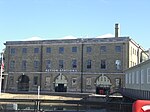Fratton Park is a football ground in Portsmouth, England and is the home of Portsmouth F.C.. Fratton Park's location on Portsea Island is unique in English professional football, as it is the only professional English football ground not found on the mainland of Great Britain. Fratton Park has been the only home football ground in Portsmouth FC's entire history.
Fratton Park was built in 1899 on the site of a market garden in Milton, a Portsea Island farming village. In 1904, the village of Milton and the entirety of Portsea Island became part of the borough of Portsmouth.
Portsmouth's football ground was deceptively named as "Fratton Park" by the club's founders, to persuade supporters that the new Milton-based football ground was within walking distance of neighbouring Fratton's railway station; the true distance between the railway station and football ground is actually one mile, or a ten-minute walk.
Fratton Park was first opened to the public on Tuesday 15 August 1899. The first ever match at Fratton Park took place on the afternoon of Wednesday 6 September 1899, a 2–0 friendly win against Southampton FC, attended by 4,141 supporters. Three days later, the first competitive home match at Fratton Park was played on Saturday 9 September 1899, a Southern League First Division 2–0 win against Reading F.C., attended by 9,000 supporters.
Sir John Brickwood (1852–1932) was Portsmouth's founding chairman. Brickwood, owner of a Portsmouth-based brewery, was also a philanthropist. In 1900, the Brickwood Brewery opened a mock-Tudor public house named The Pompey in Frogmore Road next to Fratton Park. In 1905, a mock-Tudor club pavilion was donated by Sir John Brickwood and built to the north of The Pompey pub. The pavilion, which originally had an octagonal clock tower spire on its roof, contained club offices and players changing rooms. The pavilion and The Pompey pub were both designed by Fratton Park's original architect, Arthur Cogswell.
Fratton Park's maximum capacity reached a potential for 58,000 supporters in 1935 after the North Stand and North Terrace were rebuilt, but was reduced to 52,000 for safety reasons after the Burnden Park disaster of 1946. The highest recorded attendance in Fratton Park's history was in Portsmouth's first Division One championship winning season of 1948–49 with a crowd recorded at 51,385 on 26 February 1949, for an FA Cup sixth-round match vs Derby County, a match which if Portsmouth had won, could have led to them achieving the rare Double of winning both the FA Cup and Division One championship titles in the same season.On 26 July 1948, Fratton Park hosted a Netherlands vs Ireland first-round football game in the 1948 London Olympics, one of only two grounds outside London to host matches in the Olympic football tournament. The game at Fratton Park was attended by a crowd of 8,000, with a 3–1 win to the Netherlands.
On 22 February 1956, Fratton Park became the first English football ground to stage an evening Football League match under artificial light, against Newcastle United. The original floodlights, positioned at opposite ends on top of Fratton Park's South Stand and North Stand roofs, were replaced in 1962 by floodlight tower pylons in the four corners of the ground.
Fratton Park's four corner floodlight towers, erected in 1962, became well known in Portsmouth—and also acted as a useful landmark for visiting away supporters. Since 2015, the four towers were gradually replaced by modern roof-level lights. One surviving floodlight tower, from the north-west corner, was renovated and relocated to Fratton Park's main car park on 15 July 2019 for preservation, albeit without its lighting lamps which were not required and removed. The preserved floodlight tower now also acts as a telecommunications antenna tower.
Fratton Park was used as part of the 70-day long London 2012 Olympic Torch Relay route. The Day 59 relay route began on 16 July 2012, with Portsmouth F.C. steward and D-Day veteran John Jenkins as runner number 001, carrying the Olympic flame onto Fratton Park pitch. The Day 59 torch relay route then set off from Fratton Park, through Portsmouth and eastwards to Brighton & Hove.Fratton Park is affectionately nicknamed "The Old Girl" by Portsmouth supporters, and has a reputation for high attendances and a powerful atmosphere, similar to that of larger capacity stadia. Fratton Park's maximum capacity has been reduced to 20,899 since it became an all-seater. Several relocations plans proposed during the 1990s and 2000s failed to materialise.







